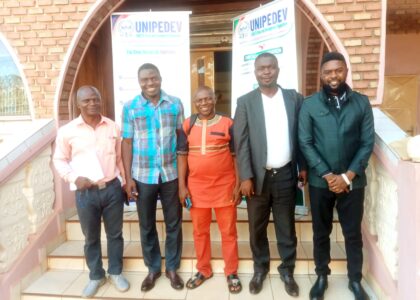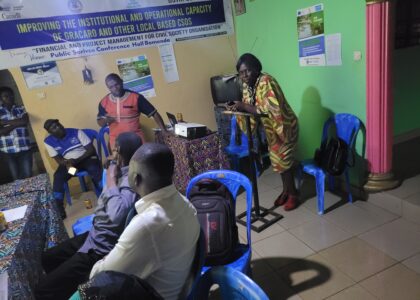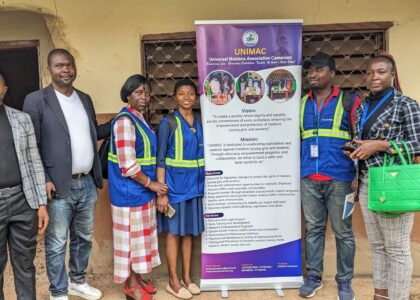
The training which began the previous day Tuesday 7 May 2024, was made up of discussions about what OCHA was all about, its areas of intervention as well as the various countries where it works, including the regions in Cameroon where OCHA is found. OCHA stands for OFFICE OF CORDINATION OF HUMANITARIAN AFFAIRS, but since it is a UN (United Nation) body it now carries UN activities and so it is now known as UNOCHA which means UNITED NATION OFFICE OF CORDINATION OF HUMANITATRIAN AFFAIRS. GRACARO was privilege to be an attendee of the seminar.
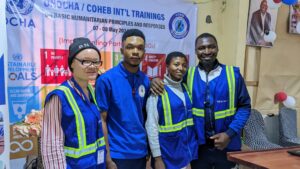
The main resource, a UN member Mr Tandah treated the main topic of the training Basic humanitarian principles and responses. He started by captivating the audience, telling them more about the UN AND OCHA.
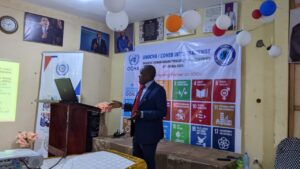
self-introduction followed where all the participants introduced themselves and their various organizations, as well as the positions they occupy.
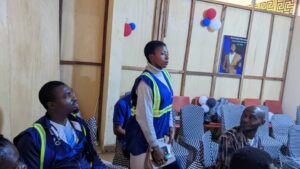
The main topics covered were; Basic Humanitarian Principles and Responses; Humanitarian actors operate based on four principles which help to facilitate access to the most vulnerable persons. The four main humanitarian principles are: Humanity, Impartiality, Neutrality, Independence. Mainly four humanitarian principles exist but some agencies like the red cross have added three making it seven namely: Humanity, Impartiality, Neutrality, Operational Independence, Voluntary Service, Unity, Universality. The core to humanity standard is to manage resources (materials, money and medical care) in a way that is responsible, limiting waste and has the best results for disaster affecting people. The various humanitarian interventions include: Health, Shelter, Protection (including Gender Based Violence), Education, Empowerment, Early recovery (Development), Psychosocial support, Food, Nutrition.
Humanitarian means having concern for or helping to improve the welfare and happiness of people.as such, some national, international, internal non-governmental and international governmental organizations include:
1.NATIONAL
GRACARO
SIWOG
COMAGEND
CAMGEW
Xhuma Africa
LUKMEF
- INTERNATIONAL
Plan international
WHO
OCHA
3.INTERNATIONAL NON-GOVERNMENTAL
CBC
4.INTERNATIONAL GOVERNMENTAL
The red cross
United Nations Organizations and its agencies
-WHP
-WFP
-UNDFPA
-UNICEF
-FAO
-ION
-UNHCR
-UNDP
-ILO
-UN Women.
-OCHA works with the UN in other to create a clear path between the government, military and the non-state gun men, so that if there is any difficulty in carrying humanitarian activities they will come in and coordinate. OCHA is in charge of coordinating humanitarian affairs.
-OCHA as well intervene in disability inclusion and have agencies and NGOs that stand at the fore front of disability affairs.
TYPES OF HUMANITARIAN CRISES.
NATURAL DISASTERS
-Floods
-Earthquakes
-Droughts
MAN MADE CRISIS
-War
-Unrest
-Civil war
-Armed conflicts
-Violence
COMPLEX EMERGENCY
-Can be a mix of Natural and man made
PUBLIC HEALTH EMERGENCY
-Corona virus
-Ebola
-Cholera
REFUGEE/IDP CRISIS
A result of any of the above: Hosting refugees, across the border or within the border.
The difference between a refugee and an Internally Displaced Person (IDP) is that, a refugee is a person who has been forced to leave their country because of persecution, war, or violence, whereas an Internally Displaced Person (IDP) is a person who has been forced to leave their home but remains within their own country.
Humanitarian work could also be referred to as; Emergency Response, Psychosocial support, child protection, water supply.
Humanitarian work could be described as:
-Economic development (building houses, buying lands, and reconstructions)
-Human rights and political campaigns
-Stabilization
and peace keeping
-Hearts and minds
EXPLANATION OF THE POLICIES
HUMANITY
Human suffering must be addressed wherever it is found. The purpose of humanitarian action is to protect life and health and ensure respect for human beings.
Protecting human life also implies three things: Treat vulnerable persons as human beings whose dignity should be respected, DO NO HARM. Avoid putting beneficiaries at risk because we want to assist them, Do not condition humanitarian aid. The United Nations has a zero-tolerance policy for sexual exploitation and abuse.
NEUTRALITY
-It is important not only to be neutral but to be perceived as neutral.
Humanitarian action must not take sides in hostilities or engage in controversies of political, racial, religious or ideological nature. In this light, we do not accept military escorts in the NW. we also maintain confidentiality by not giving out beneficiary lists.
IMPARTIALITY
Humanitarian action must be carried out on the basis of need alone. Giving priority to the most urgent cases of distress and making no distinctions on the basis of nationality, race, gender, religious beliefs, class or political opinions.
OPERATIONAL INDEPENDENCE
Humanitarian must be autonomous from the political, economic, military or other objectives that any actors may hold with regard to areas where humanitarian action is being implemented.
It is important for field workers to understand and work by the humanitarian principles because: They are frontline aid workers, Community members view of humanitarian community is based their perception of field workers, for their safety and acceptance, for a more effective response, they help sensitize communities. From there we moved to an interactive section where questions were asked and everyone was given a chance to talk. At the end of the training, the manager of COHEB read their code of conducts to all participants.
In conclusion. he thanked everyone for coming and for participating. With regret, he said they will be organizing another training in the months ahead in all to take all the topics they had planned to treat but could not treat due to time constraints. The workshop closed at about 4pm with 30 participants present.



